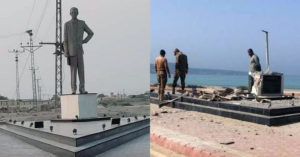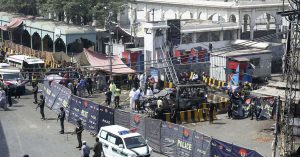Money laundering (concealment of illegally gained money then appear legal) and terror financing (activities which provide finance to individual terrorists or militant groups) nowadays is a big and dire problem. Many countries are engulfed in these problems and trying to get rid of it. Many steps have been taken to overcome these problems but all were in vain. When realized that it is a hard nut to crack a force was set up to root out terror financing and money laundering known as Financial Action Task Force (FATF).
Financial Action Task Force commonly known as FATF is a global task force formed in 1989. This task force consists of 37 countries, headquartered in Paris, France. It is currently under the presidency of Mr. Marshall Billingslea who was appointed on July 1, 2018. Three main FATF observers are Indonesia, Israel, and Saudi Arabia. The main purpose of this force is to develop policies to combat money laundering and terror financing.
FATF has provided a series of recommendations which can be followed to stop money laundering and terror financing. Countries are monitored worldwide by a task force to examine if they have acted upon its recommendations to restrain the flow of funds to banned organizations (mafias, terrorist outfits, militant groups etc). Since this is a serious threat at an international level to the integrity of the international financial system, this task force laid down the foundation of a list of those countries which are affected by or who are involved in money laundering and terror financing is known as grey list.
PAKISTAN’S HISTORY IN THE FATF GREY LIST
It was 2009 when first time Pakistan was put into the Grey List. At that time Government of Pakistan Peoples Party (PPP) was on the run. Later, the name of Pakistan was excluded from the grey list. After that, Pakistan’s name was again included in grey list in 2012 for the second time. In 2013 government of PPP ended and Pakistan Muslim League-Nawaz’s (PML-N) Government tenure started.
Amid inclusion of Pakistan’s name in the grey list, Chief of Army Staff (COAS) launched an operation on June 15, 2014, against terrorism and militant groups called Operation Zarb-e-Azb. As this operation was on the run to hunt down the terrorists, world’s fourth-deadliest Army Public School (APS) massacre happened after which operation against terrorists intensified more. This operation helped a lot in the decimation of terrorism. When witnessed by FATF watchdogs that terrorism has been reduced to the much extent, name of Pakistan was excluded from grey list in 2015.
As we know after 2015, terrorism has reduced more as compared to previous years and can be seen that it has almost vanished in Pakistan then what are the reasons that Pakistan’s name is again included in the grey list ?
These were the aggressive tweets of Donald Trump in the month of January which pointed out that “the US has foolishly given $33bn to Pakistan to curb terrorism but Pakistan has done nothing in return except lies and deceit. Pakistan has failed to hunt down the terrorist and is providing safe haven to them.”
As a result of Trump’s tweets, a meeting was conducted and the petition was launched in which Pakistan needed three votes to stay out of the grey list and Pakistan did grasp the required number of votes (Turkey, China, and Saudi Arabia) and abstained itself to be placed to the list. After this, Khawaja Asif erupted and tweeted that we have thwarted the US’s agenda to put Pakistan to the list due to which Donald Trump jointly by Modi led Indian Lobby after two or three weeks again pressurized FATF for an unprecedented second discussion on Pakistan. Pakistan again needed three votes to stay out of the list. By then, the US convinced Saudi Arabia to give up its support to Pakistan in return for full membership of FATF. Then there left only two, China and Turkey. China, which is known to be all weather friendly and whose friendship is higher than the mountains, deeper than the ocean informed Pakistan that they are “opting out as they don’t want to lose face by supporting a move that’s doomed to fail” and thus voted against Pakistan.
Turkey voted in favor of Pakistan. So, this time only one vote goes in favor of Pakistan and thus Pakistan was officially placed in the grey list on June 28, 2018 regardless of the 26 points action plan formulated by the International Cooperation Review Group (ICRG) of the Asia Pacific Group (APG) which was also submitted to the FATF to choke terror financing, money laundering, ban militant groups including mastermind behind the Mumbai attack Hafiz Saeed-led JuD and its affiliates and totally freeze their assets.
Pakistan is the ninth country to be placed on the Paris based FATF’s grey list while other eight states with strategic deficiencies are Ethiopia, Serbia, Sri Lanka, Syria, Trinidad, and Tobago, Tunisia, and Yemen. The plan to put Pakistan into the grey list was jointly moved by the US and three key powers of Europe (UK, France, and Germany) in February. Finance Minister Dr. Shamshad Akhtar represented Pakistan and argued to remove Pakistan from the grey list but they did not hear a word of her sayings.
CONSEQUENCES OF NON-IMPLEMENTATION OF ACTION PLAN
As being placed on the grey list. It is now worth exploring that what could this mean for Pakistan. How its placement can affect Pakistan’s efficiency at national and international level.
Mainly Pakistan’s inclusivity in grey list can squeeze its economy and could make it harder for the country to meet its ascending foreign financing needs. This could also lead to a downgrade in Pakistan’s debt rating. Pakistan may also suffer a risk downgrade by multilateral lenders like the International Monetary Fund (IMF), Asian Development Bank (ADB), World Bank and European Union (EU). Currently, these are the major risks which are expected can be inflicted on Pakistan.
IN CASE OF BLACKLISTED
If Pakistan fails to comply with its 26 points action plan then there is no doubt that no one can save Pakistan to be placed on the blacklist of the FATF which means total disaster of the country. Currently, FATF blacklist features Iran and North Korea.
Being blacklisted means direct sanctions on Pakistan’s major international transactions, imports and exports, foreign loans, can distort its international standing, banks can pull out, can be a fall in foreign currency inflow, further fall in Pakistan’s large current account deficit (CAD), Pakistan’s stock market can fall at a greater speed. These are few disturbing factors for Pakistan if it ends up blacklisted.
In case of the blacklist, above cited sanctions might also result up as a chaos at the national level in Pakistan leaving no jobs for the masses of Pakistan, increase in debts, increase in taxes, inflation and would be directly and constantly scrutinized by FATF’s financial watchdogs. All confidential transaction will go through under watchdog’s surveillance.
By putting all these risks aside, the factual evidence, both historic and current, demonstrates the incorrectness of these mentioned assertions. Pakistan was on the FATF grey list from 2012 to 2015. A period in which Pakistan’s imports and exports remained stable and grey listing did not prove to be a significant barrier to trade.
Recently, a delegation of FATF came to Pakistan to review the implementation of the action plan and asked Pakistan to maximize the penalty and imprisonment period for those who proved to be involved in such offenses.
What to do to get out of grey list?
The only way for Pakistan to get out of the grey list is to focus on the 26 point action plan. Implementation of action plan effectively by taking enforcement action against illegal money and value transfer services (MVTS), control on illicit movement of currency, identifying and investigating terrorist financing activity and target designated persons and entities, and persons and entities acting on behalf or acting at the direction of designated persons or entities, prevention of moving funds to designated terrorists including freezing of their assets (both movable and immovable) and demonstrate enforcement against TFS (targeted financial sanctions) violations.





